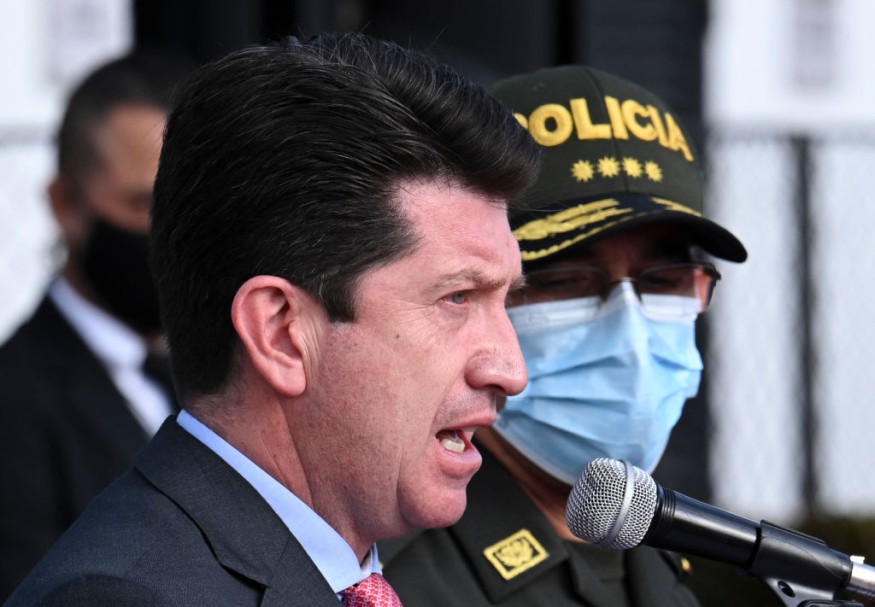Colombia's Defense Minister Calls on Colombian Gangs to Surrender or Be Hunted Down

After the arrest of Colombian drug kingpin Dairo Antonio Úsuga, known as Otoniel, Colombia's defense minister called on other armed Colombian gangs to surrender or they will be hunted down.
Colombian Minister of Defense Diego Molano noted that other gangs have 13,000 members, with half of those armed and the other half acting as support, according to a BBC News report.
Official figures show that the number of displaced families jumped by 213 percent in 2021 as compared to the previous year.
Meanwhile, children recruited by gangs also remain high, as well as the murder rate of environmentalists and social activists defending land and human rights.
Molano claimed that the key to bringing down the violence is by addressing the drugs trade in the country. The defense minister said that each hectare planted with coca means more death, "more destruction of the environment," and more killings of social activists.
READ NEXT : Colombia Seizes 10 Tons of Cocaine Worth Over $300 Million, the Largest Drug Bust This Year
Dario Antonio Úsuga's Arrest
In November, Colombia's armed forces captured Otoniel. His arrest was described by Colombian President Ivan Duque as comparable to "the fall of Pablo Escobar," Business Insider reported.
Otoniel led Gulf Clan, which was also called Autodefensas Gaitanistas de Colombia. Colombian authorities considered the group to be a "Class A Organized Armed Group."
U.S. authorities noted that the group is the main Colombian ally of Mexico's Sinaloa Cartel. The two are partnering to profit from drug trafficking and human-smuggling rings worth millions of dollars.
Úsuga is charged with drug trafficking and the killing of police officers. In addition, he also faces charges over recruitment of minors and abuse of children.
Otoniel was not only compared to Escobar for their arrests. The huge quantities of cocaine he smuggled also drew comparisons with the fallen Colombian drug kingpin and his notorious Medellin Cartel.
However, many Colombians claimed that Duque's pronouncement was a media stunt to get some press attention and legitimize his administration.
Carlos Bohorquez, a Medellin resident, said that having lived through the Escobar years, Úsuga has nothing to do with it.
Bohorquez said that it was not a good thing that Otoniel was arrested and put behind bars.
Sergio Guzmán, director of Colombia Risk Analysis, Colombia-based security and risk-analysis firm, said that the market has diversified immediately after Otoniel's arrest, with his detention opening doors to new players in drug trafficking.
Molano insisted that Otoniel's arrest marked the end of the Gulf Clan.
BBC News reported that Molano said to have spoken to one of Otoniel's men, who surrendered. One of Otoniel's gang members said that Úsuga was in control of everything, adding that the arrested drug lord was like their father.
Colombia's security forces are now hunting for his deputies, with one known as "Siopas" and "Evil Shorty."
A police officer died during the arrest operation of Úsuga.
The Gulf clan has about 1,200 armed men. Most of their members were far-right militaries.
U.S. and U.K. intelligence provided information, which led more than 500 soldiers and Colombia's special forces to the hideout of the drug lord, according to The Guardian report.
In 2016, Colombian officials started Operation Agamemnon, which led to the death and capture of Úsuga's lieutenants.
This article is owned by Latin Post.
Written by: Mary Webber
WATCH: Colombia says it captured drug kingpin Otoniel - from Reuters
Subscribe to Latin Post!
Sign up for our free newsletter for the Latest coverage!
© 2026 Latin Post. All rights reserved. Do not reproduce without permission.












